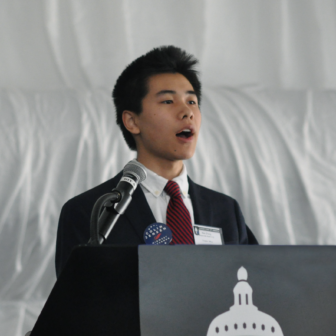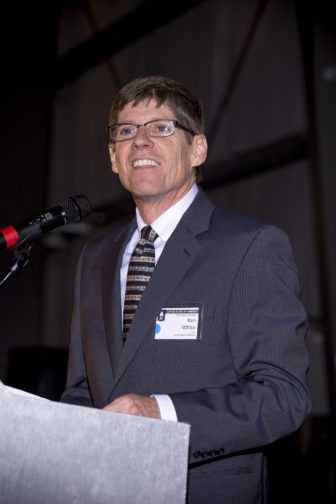
Monkey Business Images/Shutterstock
.
Every difference of opinion is not a difference of principle. —Thomas Jefferson
The meeting between President Donald Trump and North Korean leader Kim Jong-un in June was, at minimum, riveting political theater, and potentially a breakthrough moment for millions of people at risk of annihilation. In this new era of the nonconventional, the image of a sitting U.S. president talking with the leader of the insular “Hermit Kingdom” harks back to the iconic “Nixon Goes to China” moment of the 1970s.

Max Zhang
The differences between the two countries are stark (and at times appear to prove insurmountable), but those differences did not stop the meeting. And perhaps that’s part of the deeper symbolic meaning to these talks, plainly evident for all to see. A symbolism that offers an important message on civility.
And in today’s toxic and divisive political environment, the Junior State of America (JSA) emphasizes the power of civility in training new leaders. Founded in 1934, it was established in the midst of an economic depression gripping the country. Created by Professor E.A. Rogers in the mountains of Los Gatos, Calif., the young teenagers at the Montezuma School for Boys were inspired and encouraged to devise solutions to the problems they saw in the nation. Today, JSA continues this rich tradition by teaching high school students how to have civil conversations and talk respectfully across difference.
Needed: respect
In our hyperpartisan environment, basic norms of dialogue have been supplanted by shouting and shunning. Aggression has become a fundamental element to the vast majority of our political conversations. Opportunities for talking and learning across (what research suggests is an ever-increasing sense of) difference have become increasingly rare.
The JSA promotes and emphasizes respect and civil dialogue among 10,000 high schoolers from 34 U.S. states and territories. Even in these turbulent times, JSA members have learned to respond differently. Of course, the teens in our organization (and the hundreds of thousands of JSA alumni) are neither naive nor immune to stress and “othering.” However, three important JSA practices help our students engage with and learn from different perspectives.

Ken White
Respect the speaker: Listen, and consider what you can learn, when someone is talking. This seems simple enough, but in a viral world where yelling and talking over another is newsworthy, we challenge the norm. In chapter meetings, at one-day conferences and multiday conventions, our students learn by listening to each other. From a meeting with only 10 people to a debate room filled with 1,000, the common phrase heard among JSA members is “Respect the speaker.” You can only do that if you are listening actively.
Learn with peers: As the nation’s largest student-led and student-run organization, JSA members are responsible for planning, coordinating and implementing the initiatives that are core to JSA — civic engagement projects, chapter meetings, candidate nights and conventions for more than 1,200 students. They work together and learn from each other. Adults serve as mentors and coaches but by interacting with other politically engaged students, compromising on issues big and small, navigating the pathways of agenda-setting, speaker invitations, debate moderation and organizational communications, JSA members, from freshmen through seniors, learn and practice skills in management and leadership.
Learn from failure: Often the world tells us that success only comes from winning. Students in JSA learn that success has many forms — such as being bold enough to raise your hand for the first time in a room full of peers to share your perspective on a hot-button issue. For the students who take on major leadership responsibilities in JSA, failure is inevitable. Not every convention will work out how you planned it; keynote speakers will cancel and debates will have to be rescheduled. In the midst of each of these hiccups, our students, with the help of adult mentors, learn that failure is part of learning and growing.
Educators make the difference
In the last few months, we’ve seen an increase in political engagement — from more diverse candidates running for elected office to more young people leading movements and getting involved in political issues. However, while there is a desire to engage with people with different views, many people report feeling woefully ill-equipped for that task.
JSA’s model works with educators as coaches and mentors to help prepare young people for difficult conversations. Studies show that the hyperpartisan environment we live in is dramatically eroding our intellectual, social and emotional intelligence. We want to act better, yet we fall into familiar and often negative habits that display anger, withdrawal or hateful responses. And this type of behavior is contagious. Educators are key to helping train young people that they can respond differently.
JSA students report that they are more likely to respect and interact with people from different backgrounds and political beliefs. Similarly, 60 percent of our adult alums respect and interact across difference. These are skills that JSA emphasizes heavily as part of its leadership model. Our debates, thought talks and the essence of our chapter meetings invite students to be civil to each other and create a “safe enough” space where multiple voices are heard.
Building this type of space is important to JSA and to our country. We believe this is the path to helping train courageous and respectful leaders. And it’s the key to building a more courageous democracy — a society where we seek first to understand, respect each other’s opinion, listen and then engage civilly. If you would like to learn more about JSA and how to bring a chapter to your school, visit www.jsa.org.
Max Zhang is a rising senior at Naperville North High School and chair of Junior State of America’s student-run Council of Governors, made up of elected leaders from JSA’s 10 geographic regions.
Ken White is CEO of the Junior State of America, an 84-year-old student-led nonprofit that prepares more than 10,000 high school students annually for lifelong involvement and responsible leadership in a democratic society.





























